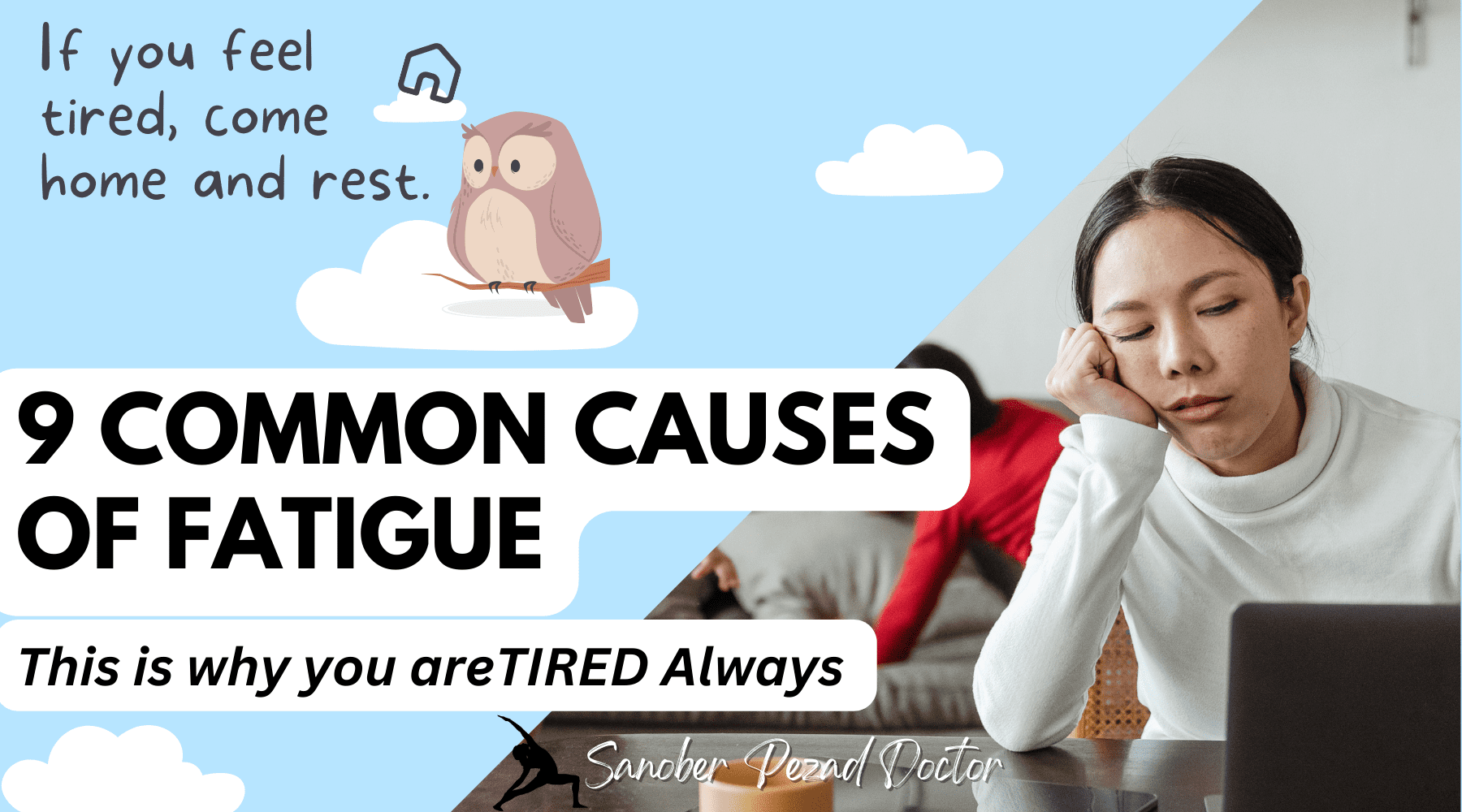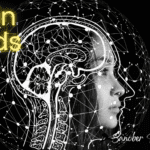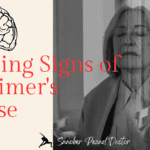The Most Common Causes of Fatigue That You Should Be Aware Of

I was pleasantly surprised to learn that the feeling of being exhausted is so common these days that there is an acronym to refer to this condition- TATT, which stands for “Tired All The Time”.
It is normal to feel tired once in a while. But if you feel tired ALL the time, feel exhausted & feel a constant lack of energy, then it is something that needs deeper digging.
There is also a possibility that you visited your doctor, and complained about the same, and he/she recommended ‘some supplements’, did ‘some tests’, and told you everything is OK! Trust me, I have heard that from my Clients ALL the time in my Integrative Coaching practice. But I want to make it clear that it is NOT OK to feel tired ALL the time.
Sometimes, obvious reasons may include:
- too many late nights
- spending long hours at work, or
- a baby keeping you up at night
Now there are way too many causes that can lead to feeling fatigued and it is impossible to touch all the causes today. I highly recommend working with your doctor to help you identify YOUR underlying cause. But I’ll try my best to address the most common and important causes for you to start working on, in case those are contributing to your fatigued state.
Lifestyle Factors Contributing to Chronic Fatigue
In today’s 24/7 “always on” world, we often try to cram too much into our daily lives. This leads to unhealthy lifestyle practices such as:
- Not getting enough sleep
- Eating poorly or too little in an attempt to lose weight
- Eating too much or at the wrong time
- Medicines, such as the over-the-counter meds used to treat allergies or coughs
- Too little physical activity
- Too much physical activity
- Alcohol or drug use
- Smoking/ Passive Smoking
- Even quitting smoking!
Lifestyle causes contributing to fatigue are non-negotiable changes that you definitely need to work on, not only to eliminate fatigue but for overall health. Need I say more?
Before we delve into the other causes of fatigue, I want you to first understand what exactly we mean when we address the term- Fatigue!
What is Fatigue?
Fatigue is a constant feeling of tiredness and exhaustion that does not get relieved by rest or sleep. The symptoms of fatigue can vary depending on the underlying cause. Some common symptoms include:
- Feeling constantly tired, even after getting enough sleep
- Lack of energy or motivation
- Trouble concentrating
- Irritability or mood swings
- Slow reactions and reflexes
- Difficulty with memory and thinking
Now that we have understood what exactly being fatigued means, let’s discuss the other factors responsible for Chronic Fatigue.
Psychological Causes of Fatigue
I personally feel this is an overlooked cause and more often than not, there is almost always a psychological factor that is contributing to a chronic state of tiredness. These include:
1- Stress: As easy as it is for me or anyone else to give advice about “stressing less”, I think it is inevitable. The strains of daily life can worry most of us at some point. But we need to identify if this mental anxiety related to a particular task or person is the cause for affecting our body’s ability to cope with everyday stressors. It’s also worth remembering that even positive events, such as shifting houses or getting married, can cause stress.
2- Emotional shock: The loss of a loved one, or even a relationship break-up can make you feel tired and exhausted.
3- Depression: If you feel sad, low, and lacking in energy, and wake up feeling tired all the time, you may have depression.
4- Anxiety: On the other hand, if you have constant uncontrollable feelings of anxiety, you may have generalized anxiety disorder (GAD). Apart from feeling worried and irritable, people with GAD often feel tired.
Needless to say, you should always seek the help of your doctor if you identify yourself with any of the above.
But in the meantime, you also need to find a way to destress and calm your mind if you find yourself getting affected. See what works best for you. This might include taking some time out for yourself, going for a quiet walk, meditating, or listening to music.
One of the biggest stress busters I find that works super is- ‘Talking it out’. There is nothing better than having someone hear your anxieties and deepest worries. I am sure there is this one person in your life with whom you can be vulnerable, speak your heart out and have an open chat about anything and everything.
Man is a social animal and thrives on relations. Trust me, getting it out of your system & having a companion is the finest way of destressing. It will reduce the release of ‘cortisol’- the stress hormone and promote the feeling of happiness and abundance!
Physical Causes of Fatigue
There are several health conditions that can make you feel tired or exhausted.
These include:
- iron deficiency anemia
- an underactive thyroid (hypothyroidism)- Thyroid hormones are a key metabolic regulator and disrupted thyroid function slows down all aspects of energy production. This can lead to symptoms including fatigue, weakness, and lack of energy.
- inflamed sinuses interfering with rest and sleep
- sleep apnoea-a serious sleep disorder in which the breathing repeatedly stops and starts. If you snore loudly and feel tired even after a full night’s sleep, you might have sleep apnea & must get evaluated.
Other common physical causes of tiredness can be due to:
- pregnancy – particularly in the first 12 weeks
- being overweight or obese – your body has to work harder to do everyday activities
- being underweight – poor muscle strength can tire you more easily
- cancer treatments, such as radiotherapy and chemotherapy
- side effects of medicines and some herbal remedies
Nutrient Deficiencies causing Chronic Fatigue
This is perhaps the most common cause assumed to contribute to chronic fatigue. I say assumed because I know this is what is most commonly discussed. Hence, it is worthwhile discussing the various vitamins & minerals of importance as a lack of these essential nutrients can disrupt energy metabolism, lead to hormonal imbalances, and can impact your sleep, all of which are risk factors for developing fatigue.
Here are common nutrients needed for energy metabolism and restful sleep.
- Vitamin B12 and folate– Vitamin B12 and folate play a vital role in the production of energy. Both nutrients are needed to produce red blood cells, which carry oxygen to all the cells in the body. When your cells are well-oxygenated, they can produce energy more efficiently.
- Iron – Iron is a component of hemoglobin, a protein in red blood cells that binds to oxygen and carries it to all cells in the body, where it’s used to produce energy. Iron deficiency causes anemia, a medical condition characterized by severe fatigue and exhaustion. Red meat is an excellent source of Vitamin B12, folate, and iron. I love my meat and while there are various other sources of getting these nutrients such as dark leafy greens, dates, and blackstrap molasses, they are unparalleled to the benefits of consumption of organic grass-fed organ meats.
- Vitamin B1– Vitamin B1 helps your metabolism convert fuel into energy, and vitamin B1 deficiency can quickly result in fatigue and lack of energy. Nutritional Yeast, nuts, and wild-caught seafood are excellent sources of Vitamin B1.
- Magnesium– Magnesium is required for the production of energy. If the body has inadequate access to magnesium, then energy production suffers, leaving you prone to fatigue. Topical Magnesium is a great way of getting your daily requirement as the absorption through the skin is much more effective than oral intake.
- Potassium- Often overlooked, potassium is a key element involved in the way every cell of the body functions. It is part of the Na-K ATPase pump, which is basically the crucial factor regulating the way our body utilizes ATP- the energy currency of the cell. The lack of potassium often presents as fatigue, to begin with, but can progress to muscle cramping and neurological disturbances if it is severe. Inadequate amounts of these minerals can increase the risk of sleep disturbances and imbalanced sleep cycles, causing fatigue and tiredness.
I am sure you have felt that liveliness and spark after you have a bite of your favorite dark chocolate or a banana. These together with dark leafy greens are rich sources of magnesium and potassium and hence their regular consumption is beneficial.
Unexplained causes of Chronic Fatigue
I also want to address 4 other important causes of unexplained fatigue which are not discussed very commonly:
1. Adrenal fatigue
Adrenal fatigue is a result of overworked or fatigued adrenal glands that can result in symptoms of fatigue.
During stress, the adrenal glands produce adrenaline and cortisol. These stress hormones are important in regulating the stress response and are essential for hormonal balance and metabolism. They also impact the blood sugar levels and the body’s sensitivity to insulin.
Prolonged or chronic stress can cause the adrenal glands to become overworked and eventually burn out, leading to symptoms such as fatigue, and insulin resistance thereby causing blood sugar imbalances, and difficulty recovering from stress. Other symptoms associated with adrenal fatigue include sleep problems, mood swings, anxiety, and salt cravings.
Adrenal fatigue Remedies include:
- Vitamin B1 (Thiamine)
- Adaptogens like 3-Key Adaptogen Mushroom Immunity Powder & Organifi Gold Adaptogen Powder
- Getting more sleep
2. Chronic fatigue syndrome
Chronic fatigue syndrome (CFS) is a complex condition characterized by extreme and debilitating fatigue that doesn’t appear to be connected to any underlying medical condition.
According to research, the exact cause of CFS isn’t well understood. It’s suggested to result from a combination of factors, including disturbed sleeping patterns, viral infections, nervous system dysfunction, hormonal imbalances, and genetic predisposition.
3. Keto fatigue
Relatively unknown, but if you were considering transitioning to a ketogenic diet, you should be aware that keto fatigue, also known as keto flu is a common symptom of feeling tired and fatigued during the initial transition phase. It typically diminishes within the first few weeks of going on keto and is a normal response to the powerful changes in your metabolism.
During the early stages of keto, your body shifts to burn fat instead of sugar for energy. Your brain, muscles, and organs must adapt to utilizing fats. Going on keto can cause carbohydrate withdrawal, temporary electrolyte imbalances, and dehydration. It can also increase the need for B vitamins, all of which can trigger feelings of extreme fatigue.
The good news is that keto fatigue typically goes away after a week or two once your body adapts to keto. But it is better to know what to expect before you dive into this particular form of eating.
4. Lack of sleep
It does not matter what you eat or what you do during the day, but if you don’t get enough restful sleep, you are definitely going to feel tired and fatigued in the long run. Sleep issues disrupt the body’s ability to regulate energy levels and can cause hormonal imbalances linked to tiredness and exhaustion.
In addition, poor sleep can also contribute to other factors that cause fatigue, such as decreased immune function, weight gain, and depression, all of which can worsen fatigue and reduce overall well-being.
Besides the number of hours of sleep, the quality of sleep is equally important. Some tips to promote restful, deep sleep include:
- Get out in the sun or expose yourself to infrared light- Infrared & Near-infrared light has a soothing effect on the body and it’s the most conducive wavelength to help keep you get relaxed for a good night’s sleep. In a recent study in which red-light therapy (wavelength = 670 nm, light dose = 4 J/cm2) was used, Yeager et al, indicated that red light could restore and enhance melatonin and energy production.
- Melatonin- A more powerful antioxidant than glutathione, a good amount of melatonin is key to having deep, restful sleep
- Blue light Blocking Glasses– While some amount of blue light is beneficial, the excessive blue light from artificial sources like digital screens, LED lights, and fluorescent lights can interfere with falling asleep & getting a good night’s sleep. Getting a pair of medical-grade- blue light-blocking glasses is one of the most economical ways to protect your eyes & ensure you get good sleep.
- Organic, Ergonomic Mattress & Bedding– Even if you have a poor bed and pillow, this can lead to some serious sleep issues. I often see people neglect their bedding whereas we spend almost 1/3rd of our lives asleep. I cannot recommend enough the importance of investing in an organic mattress, pillow, and bedsheets to ensure that you have restful sleep in a non-toxic environment.
5. Low stomach acid
I am sure, many tend to neglect this important cause, but we require adequate stomach acid to ensure the food we eat is properly digested. Low stomach acid, also known as hypochlorhydria hampers the digestion of proteins, and the absorption of vitamins and minerals and can result in iron and vitamin B12 deficiencies, resulting in anemia and fatigue.
The consumption of raw apple cider vinegar or betaine hydrochloride capsules will be effective. Be careful with the consumption of raw apple cider vinegar as it can dissolve tooth enamel. A very good alternative is Dr. Berg’s Advanced Digestive Formula Extra Strength, it contains apple cider vinegar, betaine hydrochloride & other herbs that support optimal digestion.
The Verdict
The human body is complex, and imbalances in one system can quickly impact overall physiological functioning, which can lead to fatigue.
Remember, fatigue is a common symptom linked to various causes, including underlying medical conditions, medication use, and hormonal imbalances. Together with unhealthy lifestyle habits, including poor diet, lack of regular exercise, and poor sleep, the symptoms of fatigue can amplify manifold.
Ruling out medical causes, making appropriate dietary changes, and focusing on healthy sleep are the first steps to address and combat fatigue, tiredness, and persistent lack of energy.
Also remember, that fatigue can either be a symptom of one specific underlying imbalance, or the result of a combination of factors, making it challenging to diagnose its exact cause.
If you experience unexplained fatigue, consult your doctor to identify possible medical concerns or medications that may cause your persistent tiredness and lack of energy.
A basic thorough physical examination, blood tests, and other medical tests can also help identify fatigue-related causes, including iron deficiency, autoimmune disorders, or underactive thyroid function.
An expert can help tailor your efforts to your unique biology and needs, so you can experience the most effective results possible.
As one of the only few skin and health coaches in the world, we provide online coaching for people around the globe.
Sending lots of healthy and happy wishes your way. ?
P.S.- If you like what I share, consider Subscribing to stay connected & Up to Date with the latest Pearls of Wisdom. I do NOT spam. Promise! ?
Also, please leave a comment and share the article with your loved ones. Sharing is Caring!
Feel free to ask a question or leave a suggestion as well. I am always open to learning. ?











Comments
Thanks for this insightful article! I came across this at the right time, just as I have been considering looking into why I feel so sluggish lately. Very insightful.
Thank you!
I have many of these signs of fatigue! I take Vitamin B12 and other supplements to help with my energy levels. I have also started trying to get a little more sleep each night. Great information on how to help with this!
That is great Catherine. Good Quality sleep is definitely a game-changer!